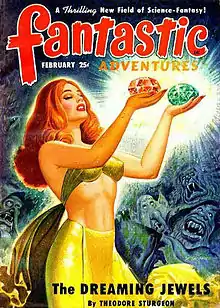.jpg.webp) Cover of first edition (hardcover) | |
| Author | Theodore Sturgeon |
|---|---|
| Country | United States |
| Language | English |
| Genre | Science fiction |
| Publisher | Greenberg |
Publication date | 1950 |
| Media type | Print (hardback & paperback) |
| Pages | 217 |
| Followed by | More Than Human |
The Dreaming Jewels, also known as The Synthetic Man, is a science fiction novel by American writer Theodore Sturgeon. It was his first published novel.
Plot
8-year-old Horton "Horty" Bluett runs away from his abusive family, carrying only a smashed jack-in-the-box named Junky. Disguised as a girl, Horty takes refuge among the "strange people" in a traveling circus. The owner of the carnival, Pierre Monetre, is a disgraced doctor and scientist with a deep hatred of mankind. Having discovered intelligent nonhuman life in the form of crystal-like jewels, Monetre works to unlock the source of their great power and, ultimately, destroy mankind. Zena, a carnival performer, takes Horty under her wing. She knows that Horty is the key to executing Monetre's destructive plan, and the only one powerful enough to stop him.
Reception and significance
Science fiction anthologist Groff Conklin characterized it as "a moving and brilliant piece of imaginative writing."[1] Science fiction editors Anthony Boucher and J. Francis McComas praised it as "a warm and beautifully human story . . . fresh, creative imaginative literature."[2] Science fiction writer P. Schuyler Miller found The Dreaming Jewels "compulsively fascinating . . . recommended as much for its people and the way it is written as for the ramifications of the plot."[3]
Science fiction author Damon Knight, however, faulted the novel as "curiously uneven." While he praised the novel's opening half -- "Sturgeon at his brilliant best: the warm insight, the compellingly real background, the exciting narrative"—he felt the work deteriorated sharply as it closed: "the characters become insipid and lifeless, the writing flat, and the action a humorless copy of Victorian melodrama."[4]
In 2001 The Dreaming Jewels was nominated for a Retro Hugo for best novella.
In 2010 fantasy writer Jo Walton described it as "a remarkably sophisticated novel for 1950" and wrote that "This book is so much more than the sum of its tropes that it's possible to read it and re-read it without realising that they are standard tropes."[5] Similarly, in The Encyclopedia of Science Fiction, author John Clute calls The Dreaming Jewels one of Sturgeon's "most famous" and "three best" novels (alongside More Than Human and The Cosmic Rape), and describes it as "an enjoyable and sophisticated Young Adult tale."[6]
Publication history

The novel first appeared in Fantastic Adventures in 1950 before a revision was printed in book form.[7] It has since had numerous reprints, notably a 1953 Italian translation and a 1957 Pyramid Books reprint under the title The Synthetic Man.[8][9][10]
References
- ↑ "Galaxy's Five Star Shelf," Galaxy Science Fiction, November 1950, p.88.
- ↑ "Recommended Reading," F&SF, February 1951, p.58
- ↑ "Book Reviews", Astounding Science Fiction. April 1951, p.138
- ↑ "The Dissecting Table", Worlds Beyond, December 1950, p.113
- ↑ Walton, Jo. "Pondering humanity: Theodore Sturgeon's The Dreaming Jewels". Macmillan.
- ↑ Clute, John. "Sturgeon, Theodore".
- ↑ Gunn, James (1975). Alternate Worlds. U.S.A.: Prentice-Hall, Inc. p. 165. ISBN 0-89104-049-8.
- ↑ The Dreaming Jewels, The Theodore Sturgeon Literary Trust website
- ↑ Masterpieces: The Best Science Fiction of the 20th Century, Orson Scott Card. Ace Books, 2001, ISBN 0-441-01133-0. p. 80
- ↑ Women in Science Fiction and Fantasy, Robin Anne Reid. Greenwood Press, 2009, ISBN 978-0-313-33589-1. p. 293
External links
- The Dreaming Jewels title listing at the Internet Speculative Fiction Database